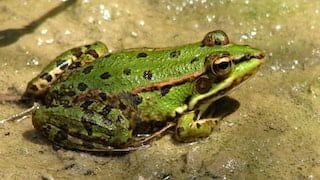by The Cowl Editor on November 14, 2019
Portfolio
by Sarah McLaughlin ’23
I hear it as I push away the last needled branch that stands between me and the open clearing.
I’ve always been fascinated by frogs. When I was two years old, toddling around barefoot in my backyard, I saw one for the first time. Somehow, my chubby, little hands managed to corner it, pick it up, and hold it for a while. Either this frog was exceptionally well mannered or it was even more naive than I was.
In second grade, I kept one as a pet. I grabbed every relevant book in the library I could carry. I caught flies in jars and filled a mug with fresh water every morning to pour into the plastic terrarium my mom bought me for Christmas. Eventually, after sitting in front of it for a few hours one day, my chin resting on my folded arms on the kitchen table, I realized that it might not be having as much fun as I was—just squatting there, staring back at me, its white throat bobbing up and down, up and down. So I brought the terrarium out to the furthest corner of the backyard, opened the lid, and watched as it sat there for a few more minutes, black eyes unmoving, before deciding to jump out. It seemed so sudden, as if it were acting purely on a whim, but perhaps it had been pondering the pros and cons of its decision. Almost immediately, it blended right back in with the grass.
A few years later, we installed an in-ground pool. It attracted all sorts of creatures—squirrels, chipmunks, mice, birds. The birds were wise enough to take quick sips from the stone patio, but the other animals would often fall in the water, swim around in frantic confusion, and inevitably have to get scooped out by one of us with a net and released on the other side of the fence.
The frogs, of course, ended up in there more often than anything else. Each summer morning, I’d walk out the back door, the patio cold and slick with dew underneath my bare feet, and I’d stand at one end, scanning for a tiny brown body with long legs pumping in a desperate breaststroke. If I saw one, I’d grab the net, dip it in the water, and chase the little guy around the perimeter until he finally ran out of breath. They never realize that you’re trying to save them.
When one of my friends found a mass of tadpole eggs in her pool, I couldn’t contain my jealousy. She knew me well, and she gave us half of them to raise ourselves. We brought a clear plastic tub of water to her house, and I held it on my lap on the ride home, now topped with a cluster of thirty or so tiny, marble-looking things. Each had a little black dot in the center that I knew—if all of those library books were correct—would somehow, within a few weeks, grow into a full-fledged frog. I could only imagine how awesome it would be to have dozens of new frogs all leaping out of the tub at once. Maybe, since I’d take such great care of them as they grew up, they’d let me hold them. Maybe a few would even hop right into my hands.
As their predicted hatch date grew closer, I spent more and more time laying outside on the patio, head resting on my arms, watching the eggs. It wasn’t until I awoke one morning to a shout from my mother downstairs that I saw them, though—tiny black dots, smaller than sunflower seeds, with wispy little tails that propelled them around the water without even creating a ripple in the surface.
There weren’t a lot of them, though, I quickly realized. Only a dozen or so had actually hatched—more than half of the eggs remained unmoving. When, after three days, they still showed no signs of life, my mother carefully scooped them out.
Nevertheless, my excitement heightened. I checked the tub every few hours for any signs of legs, even though I knew that first, they’d have to grow larger and more green.
Weeks passed, and the number of tiny bodies and tiny tails gradually dwindled. Legs began to sprout, but they didn’t even outnumber the original count of hatched eggs. Still, I watched them every day, waiting patiently for the moment when a fully-grown frog would swim to the surface.
And it did. One.
It looked so lonely in there all by itself. It swam in circles, bumping its webbed feet against the edge like the ones I fished out of the pool. So I lifted it out of the water, and before I could even move my arm away from the tub, it sprung from my hand and into the grass.
Stepping out of the cover of the trees, I plant my boots on the muddy shore. The pond—if you can even call it one—is small, shallow, and full of dead, bare tree trunks that stick out of the water like broken ribs, but it’s beautiful in its own way. The surface is motionless, like dark glass, the air quiet, not interrupted by even a cricket.
But I heard the splash. There’s not a single ripple in the water, but there must have been a moment ago. When I rustled the branch, something jumped.
It’s been a while since I’ve caught a frog. But maybe I don’t need to. Maybe just knowing that they’re still there—still hatching from eggs, still growing legs, still swimming, still jumping —maybe that’s enough.
